|
|
|
Sort Order |
|
|
|
Items / Page
|
|
|
|
|
|
|
| Srl | Item |
| 1 |
ID:
161504


|
|
|
|
|
| Summary/Abstract |
Chinese President Xi Jinping has touted an Asian security architecture in which “it is for the people of Asia to run the affairs of Asia.” But does China really want to exclude the United States from the regional order? This article argues that previous answers are often insufficient because they do not account for sub-regional variation in China’s strategy. In maritime Asia, China seeks a significantly reduced role for the US and its alliances though major constraints limit the prospects for success. In continental Asia, however, the situation is more nuanced, with Beijing alternately ignoring, supporting, or hedging against US presence. The policy implication is that Washington should not overstate Beijing’s role as either a regional adversary or a regional partner. Rather, the United States needs to approach China on its own terms across sub-regions.
|
|
|
|
|
|
|
|
|
|
|
|
|
|
|
|
| 2 |
ID:
151426
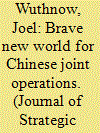

|
|
|
|
|
| Summary/Abstract |
A key organizational challenge for all modern militaries is instituting an effective command-and-control (C2) structure for joint operations. China has been a relative latecomer to joint operations, with a persistent weakness in joint C2. Reforms launched in early 2016 sought to overcome this challenge by establishing a permanent two-level joint C2 structure. Although not a ‘tipping point’ that will lead ineluctably to stronger operational effectiveness, this reform is nonetheless an important milestone in an evolutionary process towards better PLA joint operations. The result could be added operational challenges for several of China’s neighbors and the United States.
|
|
|
|
|
|
|
|
|
|
|
|
|
|
|
|
| 3 |
ID:
094973


|
|
|
|
|
| Publication |
2010.
|
| Summary/Abstract |
On May 25, 2009, North Korea conducted an underground test of a low-yield nuclear device, flaunting a Security Council resolution that had been passed in the wake of that state's first test two-and-a-half years before. The world waited 18 days for the Council to take concrete action in the form of a new round of sanctions. Although the measures passed were robust, some observers noted that China, with Russia, tried to 'dilute' them by making enforcement of financial sanctions non-mandatory, and complicating the practice of cargo inspections. Concerns were also raised about the extent to which China, wary about destabilizing North Korea and protecting its relations with Pyongyang, might be willing to implement the new provisions.1 More broadly, this case fits into a sequence of misgivings about China's participation in deliberations on a host of 'pariah' states, including North Korea, Iran, Myanmar, Sudan and Zimbabwe.
|
|
|
|
|
|
|
|
|
|
|
|
|
|
|
|
| 4 |
ID:
156603
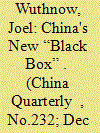

|
|
|
|
|
| Summary/Abstract |
China's establishment of a Central National Security Commission (CNSC) in late 2013 was a potentially transformative event in the evolution of China's national security decision-making structure. Yet, as of mid-2017, few details about this organization and its activities have been released, leading to continuing questions about its likely role and functions in the Chinese system. Based on an analysis of numerous authoritative but under-utilized Chinese sources, this article addresses the rationale, prospects and implications of the CNSC. It argues that the organization is both a fulfilment of a long-held desire by many in China for a centralized, permanent national security deliberation forum and also a reflection of the unique challenges facing China in the 21st century. Contrary to existing analyses, which argue that the CNSC is likely to be focused primarily on domestic security tasks, the article contends that it is more likely to play a major role in both internal and external security affairs. Moreover, the article argues that if certain obstacles can be addressed, the CNSC may have broad implications in areas ranging from China's crisis response capability to the role played by the Chinese Communist Party general secretary in the national security decision-making process. The conclusion recaps the findings and suggests avenues for further research.
|
|
|
|
|
|
|
|
|
|
|
|
|
|
|
|
| 5 |
ID:
186800
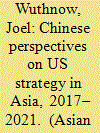

|
|
|
|
|
| Summary/Abstract |
The architects of US strategy in Asia have advanced a bold vision for a "free and open Indo-Pacific" but have paid less attention to China's views and responses. This article surveys perceptions of Chinese strategists toward the Trump administration's regional approach, arguing that China's analytic community came to see US strategy as largely focused on the Quadrilateral Security Dialogue. The most frequent Chinese prescription was a wedge strategy to weaken support for the United States among the other three Quad states: Japan, India, and Australia. Evidence from Chinese public diplomacy during the Trump years is consistent with such an approach. Yet the increase in assertive actions targeting the Quad partners revealed other impulses guiding policymakers and ultimately brought the four states more closely together. The Biden administration has an opportunity to leverage China's inability to successfully execute a wedge strategy to strengthen support for US influence and goals in the region.
|
|
|
|
|
|
|
|
|
|
|
|
|
|
|
|
| 6 |
ID:
083367


|
|
|
| 7 |
ID:
077275


|
|
|
| 8 |
ID:
182417
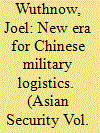

|
|
|
|
|
| Summary/Abstract |
The PLA’s ability to project force within and beyond China’s borders, which Chinese strategists refer to as “strategic delivery,” depends on adequate logistics capabilities, systems, and policies. The new Joint Logistic Support Force will play a critical role in these respects. The force, established in 2016 as part of Xi Jinping’s reforms, made its operational debut in the PLA’s response to the novel coronavirus outbreak in Wuhan in 2020. That case provides details about the JLSF’s structure, capabilities, and operations. Leveraging insights from that case, the essay portrays the JLSF as a force in transition, both the inheritor of decades of investments in logistics modernization and recent upgrades, but also a new and largely untested force with several apparent weaknesses. Unless further improvements are made, the JLSF could be a weak link in future Chinese joint operations.
|
|
|
|
|
|
|
|
|
|
|
|
|
|
|
|
| 9 |
ID:
163427


|
|
|
|
|
| Summary/Abstract |
A key feature of Asia’s evolving strategic landscape is U.S. efforts to promote policy coordination and interoperability among its allies and partners, through dialogues, exercises, intelligence-sharing agreements, and other means. Though useful in addressing practical issues and underscoring shared values, a concern is that these ‘minilateral’ activities could exacerbate Chinese fears of ‘encirclement’ and lead to strategic or economic counter-moves. However, this article suggests that a new ‘security dilemma’ in Asia is not likely. Although Chinese officials and analysts are apprehensive about U.S. bilateral alliance developments, they have largely discounted the emergence of an ‘Asian NATO’ under U.S. stewardship. This is due to perceived divergences between U.S. allies, many states’ economic dependence on China, and U.S. self-restraint. This should open possibilities for greater minilateral cooperation under most conditions.
|
|
|
|
|
|
|
|
|
|
|
|
|
|
|
|
| 10 |
ID:
190406
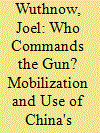

|
|
|
|
|
| Summary/Abstract |
Recent reforms to China's People's Armed Police have changed the balance of authority between central and local officials, continuing a pattern of reduced local control and granting more authority to Xi Jinping in his role as Central Military Commission chairman. The new system, however, attempts to balance central control with provisions that allow local officials down to the prefecture level to take command in some circumstances. This system intends to allow for rapid mobilization in cases of social unrest or natural disasters, although a review of emergency response plans and other Chinese sources indicates uneven implementation. The risk is that centralization could slow emergency response, although the effects will depend on the nature of civil–military coordination at different levels. The paper describes new legal authorities, assesses implementation and challenges, and reaches conclusions about the implications for Chinese political control and emergency response.
|
|
|
|
|
|
|
|
|
|
|
|
|
|
|
|
|
|
|
|
|